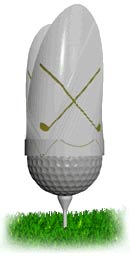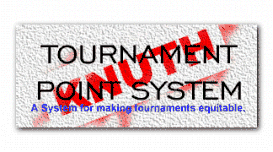|




|
Theory of Handicapping in Golf
By Horace Hutchinson. 1901
(British Amateur Champion. 1886, 1887)
There is a peculiar difficulty about getting our handicaps right at golf, a difficulty that is hardly felt in handicapping players of different caliber at other games, a difficulty that arises from the glorious uncertainty of which the game makes its boast, as of a great possession. And a great possession it is, so far as the attraction of the game goes, but to the handicap committee it is just a big nuisance. The peculiar trouble of handicapping at golf arises from the unfortunate circumstance that some golfers are very much more uncertain than others. Generally the better players are much more certain than the worse - play a more level game and more often play up to their best form. The result is that if you handicap both classes according to their respective best form, the conclusion - injustice.
Let us put in a concrete form, in which it is to be understood more easily. We will suppose that the best form of A, who belongs to the better playing class, is represented by 80, and we will suppose that the best form of B, of a much inferior class, is represented by 100. Then, on this best form principle of handicapping, A would have to give B twenty points. But the way that this would work out in practice would be that A would win at least twice to B's once on these terms, because A, as the better player far more often plays a game that is beat his best form that B does, So handicapping on the best form of each is not a fair arrangement. It favors the better players unduly, "But then," say those who favor the alternative, "if you give the long handicapped man so many points that that he will win as often as the scratch man, then it will happen now and then that he, with his handicap and with luck and happening to play his best game, will get round in a score that is impossible humanly speaking for the scratch man to touch. And it is one of the initial principles of handicapping that you shall not make your long handicapped man so things which are impossible to the scratch man, such as running a hundred yard in nine seconds or "doing" the hurdles in fifteen. To that the answer merely is that golf is not athletic sports; that you cannot gauge the capacity of you long-handicapped golfer with anything like the accuracy that you can gauge the pace of a runner even of the third and fourth class; and finally, that you must accept some risks and responsibility, must take the chance of your long handicapped man going round now and again in a score impossible for scratch man to equal, because your business as a handicapper, your whole business, is to give every one of your field, so far as in you lies, an equal chance of winning the competition for which you are arranging for them.
This as I take it, is the whole theory of handicapping, and the whole duty of the handicapper, It is so simple to that one would be inclined to say it was obvious, far too obvious to stand in need of statement, The singular thing is that in Great Britain, however it may be in America, this is very simple and necessary rule of handicapping scarcely seems appreciated at all. Of course if you drive any man right back to the grounds of his action and ask him point blank (as if it were with a pistol to his head), "What is your object in making this handicap?" he could scarcely conceivably answer in any other way than by saying the object was to start all the competitors equal. But if we always come back in this way to examine the grounds if our actions the world would be a different and more logical place. The actions, at all events and the words of the ordinary handicapper, sitting in committee, are commonly entirely at variance with any such logical conception of his functions. All sorts of fallacies parade unchecked and undected, in these committee rooms. There is the mathematical fallacy. This is the fallacy according to which a man is penalized a certain number of strokes, say two for a win and probably one for taking a second place. The fact that a man has won is an index, of course to his power as compared with the rest of the field, but it is an index that is to be watched with attention and intelligence, otherwise there is no need of a handicap committee at all after the original handicaps have once been fixed. The fact that the man won is not, in itself, a reason for reducing his handicap (the field may have been a poor one, he may have had extraordinary luck, such as holing a full drive), but of the handicap committee thinks (as it probably will think) that the fact if his having won is an indication of his power that makes it probable that he, rather than another, will win at the next competition id his handicap be left unreduced, that consideration at once constitutes a reason for reducing it. It is not because a man wins, but only in so far as his winning is an evidence of his likelihood of his winning again at the same odds, that those odds are lowered. The object of the handicapper is not a vindictive one - not to make it more difficult for a certain man to win in the future than it is for others, because that man has won in the past. It ought no to be any more difficult for him than for the others. It ought to be equally difficult for all. That, really, is the whole theory of handicapping.
Another fallacy is that which may be ticketed with the name of the bogey fallacy. A certain figure is taken as a unit, say 80 for examples sake, in which it is supposed that there is a reasonable likelihood of the scratch men going around the course. Down to this unit all are handicapped, that is to say, are given strokes sufficinent to make it equally likely that they, too, may do the course in 80 as their net score. So far there is nothing to be said against this method, but where it is rigidly applied it is common to reduce a mans handicap by the exact number of strokes by which he may bring his net score below 80, and not touch his handicap even if he wins with a score above this figure. But suppose that day is very stormy on which he wins with a net return of 80, on a rigid application of this principle he will not be reduced at all, and yet his 80, on such a day may show him possessed of greater golfing powers than a 75 return on a fair day for scoring.
The truth perhaps is that none of these methods or principles can be followed with cast iron rigidity and mathematical exactness, If they could there would be no need of the intelligence of the handicapping committee. But the committee needs to have intelligence, and to use it with attention. It is not enough for them to consider the total scores only that are returned. They must examine the cards to see the items - for this reason, of a man returns a score of 80 with steady play indicated by the score at each hole he does not thereby show as much golfing ability (i.e. his ability to win at his adds in the future) as a man who has returned the same net score with an extravagant number, say ten, at any one hole.
In order that the handicap committee may do its duty effectively, it is almost essential that it should be composed of golfers of various degree, say a scratch player, a limit handicapped man, and a medium player, for golfers are in the habit of playing with those who are something like their equals in power or importance, and with this judicious medley you are likely to get a committee fairly familiar with the form of all the different classes of players in the club. It may be pointed out, that the special object of handicapping is generally to put players on equality in scoring competitions. On many greens in England it has become the fashion to take the handicaps thus settled as the basis of handicapping for match play also. Whereby a certain injustice is done. For there are some players of the flashy, brilliant class whose match playing power is much greater than the than their ability to return a good score. They will almost always have a few very bad holes in the round which makes the score mount up, and if the odds to which they really are entitled for scoring be taken as the basis for arranging hole matching such an allowance will put more steady going golfers at an significant with them in match play. It ought to be borne in mind that the handicaps, as usually understood, are fixed for score play only.
And so, enough. The great point to be considered is the forthcoming competition. Results of previous must be taken into tour account merely as evidences of what a man is likely to do in the future. The fact that he may have a whole sideboard loaded with plates of his winning is only a valuable indication to the handicapper in so far as to points to this man's ability for future work and many a man who has never won a prize may want more reduction than he who has won so many. Principles and methods are good as a ground plan to work on, but they must not be followed to the exclusion of present intelligence. Do your very best regardless of clamors to put all your men on an equality for the competition that is about to be played - that, I take it, is the whole duty of the handicapper, the whole theory of handicapping. It sounds absurdly obvious. In practice we find it strangely ignored.
|






